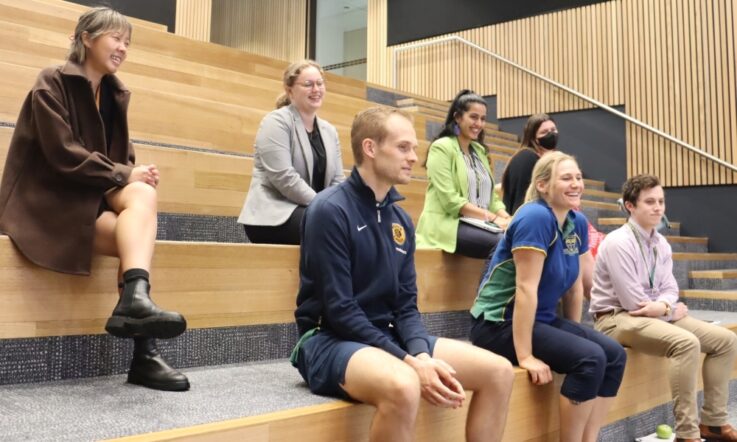If you’ve moved between schools or made the transition from graduate to the staffroom, it’s likely you’ve benefited from an induction program to help you settle into the profession, role and new surroundings. But, what about those who may miss out on school-based programs because they are employed for short periods?
A new Australian research study is exploring how induction programs can better support beginner teachers in the classroom – particularly those who are on short-term or casual contracts. Professor Anna Sullivan, from the University of South Australia, is Chief Investigator on the project, which will also focus on effective classroom management.
Ongoing induction processes
Professor Sullivan points out it can often take several years for newly-graduated teachers to find permanent employment in a school – latest Australian data show 30% of newly-graduated teachers are on contracts of less than a year, and another 30% are CRTs.
‘The Australian Guidelines for Teacher Induction emphasise mentoring embedded in daily practice, regular interactions with school leaders, as well as access to targeted professional learning, and extra time allocation for planning,’ she says.
‘Yet most new teachers do not qualify for such induction programs because they’re employed on a casual or short contract. Therein lies the conundrum. Newly qualified teachers need a comprehensive induction program, yet their employment status doesn’t enable this.
‘Learning how to manage student behaviour is one of the most important teaching skills, yet it’s also one of the top-ranked challenges faced by early career teachers, and something that could be better accommodated through a thorough and ongoing induction process.
The academic says it’s imperative that Australia’s education sector comes up with ways to better support, guide and coach new teachers. Expected outcomes of the 3-year research project include alternative policy and practice recommendations. But what can schools do now to help alleviate some of the challenges?
Actively producing knowledge
Professor Sullivan has recently co-authored a book chapter in the International Encyclopedia of Education with UniSA colleagues Professor Barry Down and Professor Bruce Johnson on early career teacher transitions (Sullivan et al., 2022).
‘The evidence from years of research clearly shows that early career teachers flourish best when they are able to actively participate in shaping the schools in which they work, and when their own knowledge and expertise is trusted,' Professor Sullivan says.
‘There needs to be a radical shift towards valuing early career teachers as actively producing knowledge, rather than merely delivering it.
‘This involves reducing workloads, involving new teachers in curriculum planning, and engaging them in participatory, democratic decision-making. In short, encouraging a spirit of collective responsibility and ownership over their work, and working environment.’
Giving new teachers voice and agency
She adds research shows early career teachers flourish when they’re encouraged to conduct local investigations ‘into the conditions in which they and their students find themselves’.
‘This is the kind of practical project that emerging teachers could undertake as part of critical learning communities. It would engage the deeper complexity of their work; helping them ask powerful questions, discover their voice as teachers, and regain the agency that they require in order to meet the changing needs of 21st Century learners.’
The academics advise that rather than attempting to make early career teachers accept whatever comes from leaders above, they need to be part of a school professional community ‘… that enables them to critically reflect on their values and philosophies of teaching: how to put them into practice, and how to harness them for innovation.’
Professor Sullivan says new teachers have high levels of hope, energy and enthusiasm in their first few years in the profession. ‘We know that, depending on certain factors, teachers can thrive during this time.
‘The culture of a school, government policy, the collegial relationships that are formed, the work they are expected to undertake, and the support they receive – all of these inform the conditions under which new teachers can thrive, survive, or burnout. If they are not conducive, it can be a time of shock, stress and burnout.
Critical learning communities
‘We believe that, to give space to the creative thinking, compassion, and social awareness that is intrinsic to teaching, it is necessary for early career teachers to become part of what we term “critical learning communities”. This would see emerging teachers working more collectively, being encouraged to question dominant ways of teaching, being free to innovate, and to engage with the philosophy and purpose of their teaching.
‘This would be a holistic and comprehensive way of providing early career teachers with a combination of support and autonomy that, as a long trajectory of research indicates, leads to a thriving and sustainable education workforce.’
References
Sullivan, A., Down, B., & Johnson, B. (2022). Early Career Teacher's Work. In R. Tierney, F. Rivzi & Kadriye Ercikan (Eds.), The International Encyclopedia of Education. Elsevier Science.
Think about your own induction program for early career teachers and those who are new to the school. Is it available to teachers on short-term contracts and CRTs? If not, what support do these members of staff get?
Professor Anna Sullivan says early career teachers flourish best ‘when they are able to actively participate in shaping the schools in which they work …’ As a school leader, do you provide these opportunities to your own teachers? Do new teachers have the same opportunities to contribute as those with more expertise?



